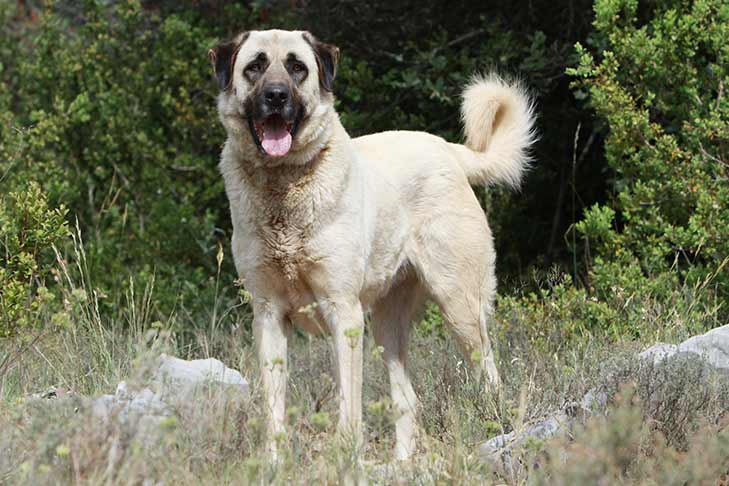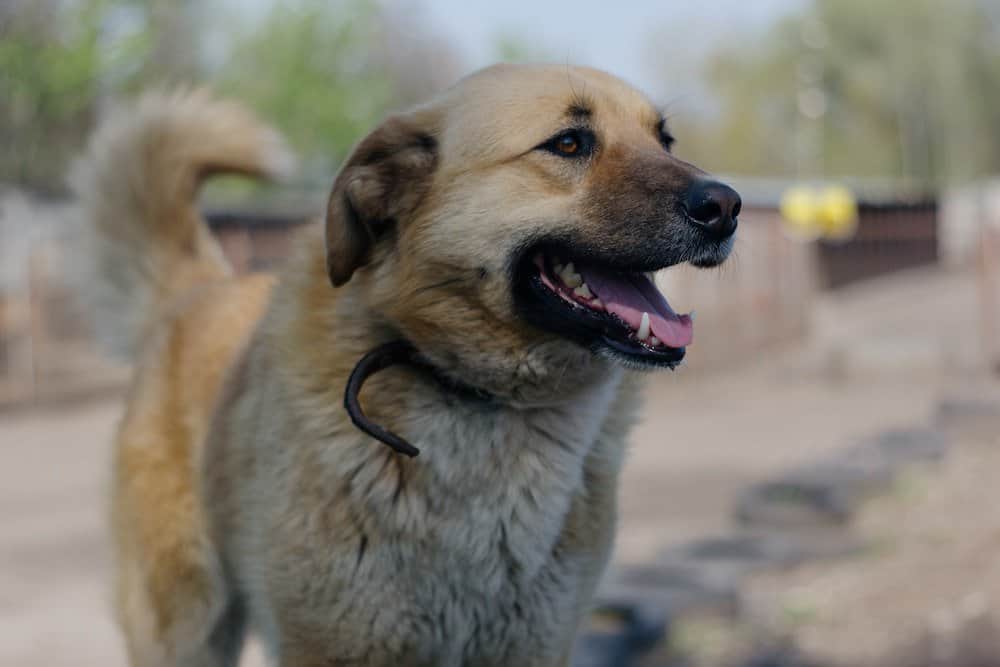Anatolian Shepherds are a unique breed, known for their rich history as capable livestock guardians. However, their wandering behavior often perplexes owners, raising questions about the reasons behind it. In this article, we'll delve into the innate instincts, burstiness, and specific contexts that contribute to Anatolian Shepherds' wandering tendencies. Understanding and managing this behavior is crucial for responsible ownership.

Anatolian Shepherds, renowned for their strength and loyalty, have been invaluable as guardians of livestock for centuries. As owners embrace these majestic dogs, it becomes essential to unravel the mystery behind their wandering behavior.
Anatolian Shepherds: A Unique Breed
Anatolian Shepherds stand out as a remarkable and distinct breed, celebrated for their unique characteristics and historical significance. Originating from the Anatolian region, these dogs have carved a niche for themselves as reliable and devoted companions.
Origin and Characteristics
Anatolian Shepherds boast a rich history, tracing their roots back to ancient times. Their primary role as livestock guardians showcases their innate protective instincts. With a robust build and a keen sense of awareness, they embody the quintessential traits of a guard dog breed.

The Innate Wandering Instinct
One of the intriguing aspects of Anatolian Shepherds is their innate wandering instinct. Rooted in their DNA, this behavior is closely tied to their role as protectors. Understanding this instinct is crucial for owners seeking to provide a fulfilling environment for their Anatolian Shepherd.
Protective Nature in Action
Anatolian Shepherds' wandering is not random; it's a purposeful act driven by their protective nature. These dogs have a natural inclination to patrol their territory, ensuring the safety of their flock or family. This behavior reflects their commitment to their role as guardians.
Perplexity of Anatolian Shepherds' Behavior
The perplexity surrounding Anatolian Shepherds' wandering habits often stems from a lack of awareness. Owners may find themselves questioning the reasons behind the seemingly unpredictable nature of their dog's movements.
Territorial Instincts Unveiled: To unravel the perplexity, it's essential to delve into the breed's strong territorial instincts. Anatolian Shepherds have a deep connection to the land they protect, and their wandering serves as a means to assert and maintain their territory.
Burstiness Factor: Adding to the complexity is the burstiness factor in their movements. Anatolian Shepherds are known for sudden bursts of energy, leading to spontaneous bouts of wandering. This burstiness, while challenging to predict, is a testament to their dynamic and lively nature.
Addressing Perplexity: Owners can address the perplexity by recognizing that Anatolian Shepherds' behavior is rooted in their genetics and purpose. Acknowledging and respecting their natural instincts pave the way for a more harmonious relationship.
Burstiness in Anatolian Shepherds' Movements
Anatolian Shepherds, known for their bursts of energy, exhibit a dynamic and lively nature that contributes to their distinctive character. Understanding the burstiness in their movements is key to comprehending and managing their behavior effectively.
Energetic Nature
Anatolian Shepherds possess a robust and athletic build, enabling them to engage in sudden bursts of activity. This burstiness is a manifestation of their energy levels, which, if not channeled appropriately, can lead to spontaneous wandering.
Sporadic Wandering Episodes
The burstiness factor becomes evident when Anatolian Shepherds transition from a calm state to an energetic one, prompting them to explore their surroundings. Owners may observe sudden bursts of movement, indicative of the dog's need for physical and mental stimulation.
Understanding Specific Contexts
Anatolian Shepherds' wandering is not random; it is often triggered by specific contexts and stimuli. Recognizing these contexts is vital for owners aiming to anticipate and manage their dog's movements effectively.
Environmental Triggers: Various environmental factors, such as unfamiliar scents, sounds, or sights, can prompt Anatolian Shepherds to wander. Understanding their reactions to these triggers helps create a more controlled and secure environment.
Social Interactions: Anatolian Shepherds are social animals, and their interactions with other dogs or people can influence their wandering behavior. Recognizing the impact of socialization on their movements allows owners to guide positive interactions.

The Importance of Addressing Wandering
Addressing the wandering tendencies of Anatolian Shepherds is of paramount importance for responsible ownership. Uncontrolled wandering can pose risks to the dog's safety and may lead to challenges for both the owner and the community.
Safety Concerns
Wandering exposes Anatolian Shepherds to potential hazards, such as traffic, wildlife, or aggressive encounters with other animals. Prioritizing safety through proper management is crucial to prevent accidents and ensure the well-being of the dog.
Community Relations
In urban or suburban settings, uncontrolled wandering can strain relations with neighbors and local communities. Taking proactive measures to address wandering not only ensures the dog's safety but also fosters positive community interactions.
Behavioral Well-being
Addressing wandering is also essential for the behavioral well-being of Anatolian Shepherds. Providing mental and physical stimulation through structured activities helps channel their energy positively, reducing the likelihood of aimless wandering.

Strategies for Managing Anatolian Shepherds' Wandering
Effectively managing the wandering tendencies of Anatolian Shepherds requires a combination of proactive strategies and a deep understanding of the breed's unique characteristics. Implementing the right techniques can help owners foster a secure environment while allowing their dogs to thrive.
Establish a Routine: Creating a consistent daily routine for Anatolian Shepherds helps regulate their activities and minimizes the likelihood of aimless wandering. Regular feeding times, walks, and play sessions contribute to a sense of predictability, promoting a more stable behavioral pattern.
Secure Fencing and Containment: Investing in secure fencing and containment systems is crucial for preventing uncontrolled wandering. Anatolian Shepherds are known for their strength, so choosing robust materials and ensuring proper installation are essential. This strategy allows them to explore within defined boundaries safely.
Leash Training: Teaching Anatolian Shepherds leash manners is an effective way to control their movements during walks. Training them to walk calmly on a leash enhances the owner's ability to guide and redirect their attention, reducing the chances of impulsive wandering.
Anatolian Shepherds and Human Interaction
The relationship between Anatolian Shepherds and their human companions plays a pivotal role in managing wandering behavior. Positive interaction, communication, and understanding contribute to a strong bond, fostering a harmonious coexistence.
Socialization from an Early Age
Early socialization is key to Anatolian Shepherds' adaptability and their interactions with humans. Exposing them to various environments, people, and situations helps build confidence and minimizes anxiety, reducing the likelihood of wandering triggered by fear or stress.
Positive Reinforcement
Using positive reinforcement techniques reinforces desired behaviors and strengthens the bond between owners and Anatolian Shepherds. Rewarding them for staying within designated areas or following commands encourages obedience and diminishes the urge to wander.
Quality Time and Attention
Anatolian Shepherds thrive on human companionship. Spending quality time engaging in activities like play, training, and affectionate interactions helps fulfill their social needs, reducing the desire to wander in search of stimuli.
Building a Secure Environment
Creating a secure living space is paramount when it comes to managing Anatolian Shepherds' wandering tendencies. Building an environment that addresses their need for protection and allows controlled exploration contributes to a harmonious and safe coexistence.
Sturdy Fencing and Enclosures
Investing in sturdy fencing and enclosures is the foundation of a secure environment for Anatolian Shepherds. The fencing should be tall, durable, and securely anchored to prevent these strong and agile dogs from escaping. Regular inspections and maintenance are crucial to address wear and tear.
Designated Play Areas
Establishing designated play areas within the property provides Anatolian Shepherds with spaces where they can release their energy safely. These areas can be equipped with puzzle toys, agility training equipment, and other mentally stimulating elements to keep the dogs engaged and reduce the likelihood of wandering.
Supervised Outdoor Time
Supervising Anatolian Shepherds during outdoor activities ensures that owners can intervene promptly if wandering tendencies arise. This hands-on approach allows for real-time guidance, reinforcing boundaries and promoting positive behavior.
Integrating Anatolian Shepherds into Urban Settings
Integrating Anatolian Shepherds into urban environments requires thoughtful planning and consideration. While these dogs have a strong protective instinct, adapting to city life involves unique challenges that owners can navigate successfully.
Leash Etiquette
In urban settings, leash etiquette is crucial for controlling Anatolian Shepherds' movements. Training them to walk calmly on a leash and follow commands enhances the owner's ability to manage their dog's behavior in busy and potentially distracting surroundings.
Exposure to Urban Stimuli
Gradual exposure to urban stimuli, such as traffic, pedestrians, and various sounds, helps Anatolian Shepherds acclimate to city life. Controlled introductions and positive reinforcement build their confidence and reduce separation anxiety, minimizing the likelihood of wandering triggered by unfamiliar stimuli.

Urban-Friendly Activities
Engaging Anatolian Shepherds in urban-friendly activities, such as structured walks in parks, dog-friendly events, and interactive play in designated areas, allows them to fulfill their need for exercise and mental stimulation without the risk of uncontrolled wandering.
Common Misconceptions
Addressing common misconceptions about Anatolian Shepherds' wandering behavior is essential to foster a better understanding of this unique breed. Dispelling myths helps owners make informed decisions and build a stronger bond with their canine companions.
Misconception 1: Wandering Indicates Discontent
Contrary to the belief that wandering indicates discontent or dissatisfaction, Anatolian Shepherds' wandering is often a manifestation of their protective instincts and bursty energy. Understanding the breed's natural tendencies dispels the notion that wandering is a sign of unhappiness.
Misconception 2: Anatolian Shepherds Cannot Adapt to Urban Living
Another misconception is that Anatolian Shepherds cannot adapt to urban settings. With proper training, socialization, and a secure environment, these dogs can thrive in cities while maintaining their unique traits. Urban living requires adjustments, but it is not incompatible with Anatolian Shepherds' well-being.
Misconception 3: Wandering Equals Aggression
Some may mistakenly associate Anatolian Shepherds' wandering with aggression. In reality, their wandering is often rooted in a protective and territorial instinct rather than aggressive behavior. Proper training and socialization can help owners manage and guide this natural inclination.
The Bond Between Owner and Anatolian Shepherd
The bond between an owner and an Anatolian Shepherd is a unique and profound connection that significantly influences the dog's behavior, well-being, and overall quality of life. Fostering a strong and positive bond is not only rewarding for both the owner and the dog but also plays a crucial role in managing various aspects of the Anatolian Shepherd's temperament, including their wandering tendencies.
Understanding the Significance of the Bond:
The bond between an owner and an Anatolian Shepherd is built on trust, mutual respect, and companionship. This connection goes beyond the surface level of obedience training and commands, delving into the emotional and psychological aspects of the relationship.
Positive Reinforcement and Trust Building:
Utilizing positive reinforcement techniques is instrumental in building trust and strengthening the bond. Anatolian Shepherds respond well to praise, treats, and affection when they exhibit desired behaviors, creating a positive association with their owner. Consistency in positive reinforcement establishes a reliable and secure foundation for the dog.
Shared Activities and Quality Time:
Engaging in shared activities and spending quality time together further cements the bond. Anatolian Shepherds, being social animals, thrive on companionship. Regular walks, play sessions, and even simple moments of relaxation together contribute to a deeper understanding and connection.
Communication and Understanding
Effective communication forms the cornerstone of the bond between owner and Anatolian Shepherd. Understanding the dog's body language, cues, and vocalizations allows the owner to respond appropriately to their needs. This mutual understanding fosters a sense of security for the dog, reducing anxiety and the inclination to wander.
Impact on Wandering Behavior:
The strength of the bond directly influences the Anatolian Shepherd's behavior, including their wandering tendencies. A dog that feels secure and bonded with its owner is more likely to stay close and respond to commands, diminishing the desire to roam independently.
Building Trust through Training:
Training sessions provide opportunities to reinforce the bond while instilling obedience and discipline. Anatolian Shepherds, being intelligent and trainable, appreciate mental stimulation. Positive, reward-based training not only addresses wandering behavior but also strengthens the communication and trust between owner and dog.
The Role of Leadership:
An Anatolian Shepherd thrives under a confident and assertive owner who assumes the role of a leader. Leadership provides a sense of direction and security for the dog, influencing their behavior positively. When the owner establishes themselves as a reliable leader, the Anatolian Shepherd is more likely to look to them for guidance, reducing the likelihood of aimless wandering.
In conclusion, the bond between owner and Anatolian Shepherd is a dynamic and evolving relationship that profoundly impacts the dog's behavior, including their tendency to wander. By prioritizing positive reinforcement, shared activities, effective communication, and leadership, owners can cultivate a strong bond that not only enhances the overall well-being of the Anatolian Shepherd but also minimizes challenges associated with wandering behavior.

Conclusion
In conclusion, Anatolian Shepherds' wandering behavior is a complex interplay of instincts, burstiness, and specific contexts. Responsible ownership, coupled with understanding and proper management, ensures a fulfilling companionship with these remarkable dogs.
FAQs
- Q1: Can I train my Anatolian Shepherd to stop wandering completely?
- A: While complete elimination may be challenging, consistent training and a secure environment can significantly reduce wandering.
- Q2: Are Anatolian Shepherds suitable for urban living?
- A: With proper acclimation and care, Anatolian Shepherds can adapt to urban environments, but it requires careful consideration.
- Q3: Do Anatolian Shepherds get along with other pets?
- A: Early socialization is crucial, and with proper introductions, Anatolian Shepherds can coexist with other pets.
- Q4: How do I create a secure space for my Anatolian Shepherd?
- A: Utilize sturdy fencing and secure gates to establish a safe and contained area for your Anatolian Shepherd.
- Q5: What role does exercise play in managing wandering behavior?
- A: Regular exercise is vital to channel their energy positively, reducing the likelihood of wandering.